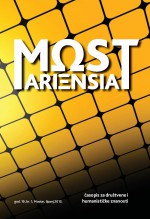Fleksibilnost argumentne strukture odglagolskih imenica na -nje
Argument Structure Flexibility of Deverbal Nouns with the Suffix -nje
Author(s): Lidija ŠaravanjaSubject(s): Morphology, South Slavic Languages, Philology
Published by: Sveučilište u Mostaru i Institut društvenih znanosti Ivo Pilar, Zagreb
Keywords: nominalization; -nje deverbal nouns; argument structure; argument constellation; agent; theme;
Summary/Abstract: Reasons for nominalization use in the Croatian language can be of linguistic and nonlinguistic nature. Nominalization is used to contract, simplify, abstract and intellectualize. The most productive nominalization affix in Croatian is the suffix -nje, which, according to a number of criteria, corresponds to the English suffix -ing. This suffix is referred to in the paper primarily because of the theoretical framework based on the English language. The paper focuses on the capability of argument to change position within the argument structure. The highest level of such flexibility can be found in deverbal nouns with two arguments, one of which is direct object. Semantic properties of nouns and morphological properties of arguments influence the flexibility of their argument structure. It has been noticed that most of nominalizations ending in -nje and having incomplete argument structure are ambiguous (e.g. Luka’s arrest, Mary’s bullying) and share certain features with passive constructions.
Journal: Mostariensia - časopis za društvene i humanističke znanosti
- Issue Year: 19/2015
- Issue No: 1
- Page Range: 45-57
- Page Count: 13
- Language: Croatian

